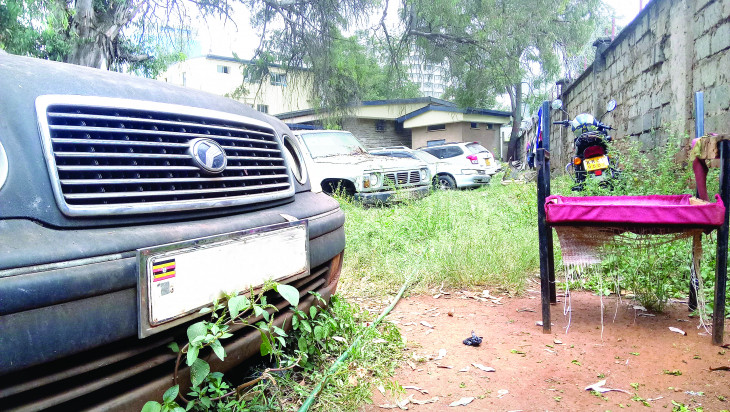How rogue officers turn police stations into vehicle junkyards

With tears streaming down his cheeks, Noah Ogutu (not his real name) recounts how he watched his whole world roll away from him one morning on Thika Superhighway.
For over 20 years, Ogutu, a father of four, had been eking out a living from his matatu business whose proceeds he used to educate his children.
But on the morning of November 22, 2021, the matatu, the only source of his living, was impounded by a traffic officer and towed to a police station in Nairobi for allegedly being rickety, having not been inspected, being operated without valid insurance and the driver failing to produce a certificate of good conduct.
The officers demanded a Sh400,000 bribe to release the vehicle.
“I am losing a lot every day as the officers want money before they release my vehicle. I have however launched complaints with the relevant authorities,” he said.
Several trips and pleas by Ogutu to the police station have borne no fruit. His attempts to produce relevant papers to the police have only been met with silence.
Livelihood
A similar fate befell Wilson Kamau when his motorbike was impounded by officers in the Central Business District on grounds that the rider he had employed was not wearing a helmet and a reflector jacket. To make matters worse, the motorbike was not insured.
He said officers at the Central Police Station demanded a Sh40,000 bribe.
“I tried to meet the conditions they gave me, including producing ownership papers but they kept changing the goalposts. I am considering looking for money to buy another motorcycle,” he said.
For Kamau, like hundreds of other boda boda operators and motor vehicle owners, his motorbike was not just another machine, it was his livelihood.
“I worked my way out of joblessness. I bought my own motorbike. Now they have taken it away, taken my job and they are still asking for bribes to release it. It’s not fair,” he says.
Ogutu and Kamau are a few examples of thousands of Kenyans whose source of income has been taken away by ruthless police officers who impounded their vehicles or motorbikes either on framed-up charges on flimsy grounds.
Such vehicles and motorbikes are rusting away at police yards across the country.
A cursory glance at most police station yards and stores gives one the impression that it is a government junkyard.
Seized, recovered or abandoned vehicles, motorcycles and other exhibits not only eat up space but have also become an eyesore in police stations.
Prolonged cases
Investigations by People Daily have established that stockpiles of unclaimed end-of-life vehicles and motorbikes in police stations have been lying there for years.
Some of them are exhibits that, because of prolonged cases, have to remain in police stations until the courts issue their verdicts.
But investigations have revealed that the motivation for detaining some of the exhibits is not entirely professional.
Interviewed officers confessed that police stations were grappling with a crisis of space for impounded vehicles and motorbikes.
Some of the vehicles, motorcycles and other junks were seized in fairly good condition but ended up being vandalised while others deteriorated due to poor storage.
Regarding old police vehicles that are also part of the junk, the Interior Ministry has attributed this to complex procurement and disposal regulations that have made it difficult to dispose of them and other government vehicles that are unserviceable.
But retired senior officers who spoke on condition of anonymity blamed the pile up at police stations on Officers Commanding Stations (OCS) for impounding some vehicles without offences and creating unnecessary hurdles to extort owners.
“Most OCS will launch a crackdown on vehicles or motorbikes with the aim of extorting owners. They ask for so many documents in order to release the vehicles. Out of frustration, the owners end up abandoning the items in police yards,” says a former senior police officer who served in Nairobi as the Provincial Police Officer.
In most instances, the former top cop says, OCS uses tricks to detain the vehicle or motorbike for more than six months so that he can make a proclamation and swear an affidavit in court to be allowed to auction it without the knowledge of the owner. “Most of the proclaimed items end up being bought by the officers, their relatives and friends at a throwaway price,” the former officer disclosed.
The National Police Service Act gives police the power to sell such vehicles after seeking the consent of a magistrate. The process begins with the police presenting an inventory of the assets in court to get orders to advertise them as unclaimed.
Once granted, a public notice of the sale is made, giving the owner a year to claim the asset through the same court.
In most cases, they go unclaimed after which the magistrate will direct that the vehicles be auctioned.
“If no owner establishes a claim to the property within 12 months from the date of the notice, the property may be sold in a manner directed by the magistrate,” section 63(5) of the Act reads.
Release exhibits
The National Police Service spokesperson Bruno Shioso yesterday said under police regulations, officers are expected to handle any exhibit seized, recovered, abandoned, lost or found in a professional manner to ensure they are not damaged or depreciate in value.
“Until an order is passed, we are bound to detain the exhibits at our stores and yards,” he said.
Station and other commanders have now been directed to release all exhibits detained unnecessarily to avoid further losses to owners.
“We are keen to ensure that owners of these abandoned junks who are not guilty of criminal offences do not suffer serious losses. Officers should also go out of their way to trace the owners of unclaimed vehicles and other exhibits,” he said.
However, Shioso admitted that the pile of junk exhibits and other confiscated items at police stations are not only an environmental challenge but also a security risk.
“Yes, it’s a challenge, and a health and environmental hazard too. It’s also a security challenge. We usually try to dispose of most of such unclaimed properties, including exhibits, through due process,” Shioso says.
On the many motorbikes at police stations, Shioso partly blames the owners for failing to present legitimate documents.
“This is mostly in cases with boda bodas where riders/owners lack requisite documents including insurance hence forego collection to avoid more penalties or sanctions,” he says.












